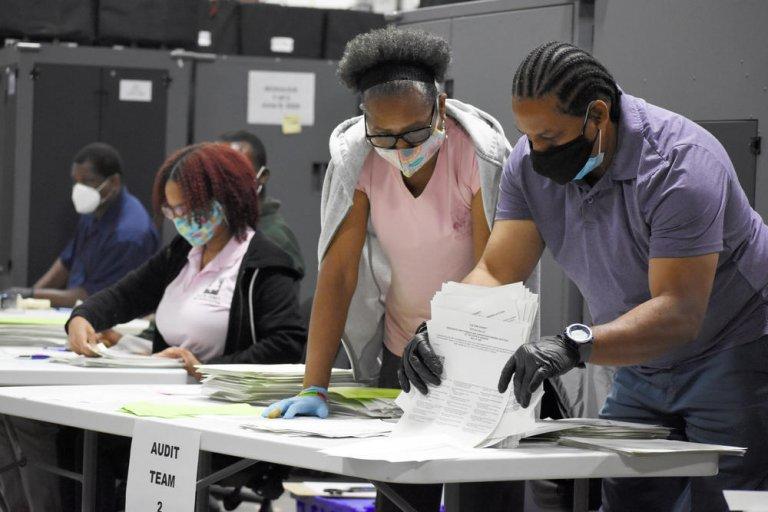
Caption
Georgia’s State Election Board approved a new rule Tuesday that would give local officials more authority to dispute election results if there is a discrepancy in vote totals.
Credit: Stephen Fowler / GPB News

Georgia’s State Election Board approved a new rule Tuesday that would give local officials more authority to dispute election results if there is a discrepancy in vote totals.
Georgia’s State Election Board gave initial approval to an amended rule Tuesday that would give local officials more authority to dispute election results if there is a discrepancy in vote totals tallied and the number of votes cast at precincts.
The proposed rule, approved by a 3-1 vote during Tuesday’s state board meeting, would require local election officials to count ballots at the precinct level on election night and investigate any discrepancies prior to certifying the election.
Three Republican board members supported a measure they believe will help reduce the likelihood of inaccurate ballot totals requiring correction long after an election is over.
The changes to election rules could be in place for this November’s general election if the proposed amendments are finalized next month.
The rule also states that election board members should be able to examine all election records prior to a certification vote if there is a discrepancy in the voting data.
GOP-appointed Fulton election board member Julie Adams alleged in a recent lawsuit that she was denied access to election records necessary for her to feel comfortable voting for certification of the May 21 primary.
Salleigh Grubbs, chairwoman of the Cobb County Republican Party, presented a rule to the election board that she said reaffirms what already exists in state law. The rule would likely have been able to detect that Fulton County poll workers had double scanned absentee ballots if the procedures in the rule had been followed in the 2020 election.
The State Election Board voted in June to reprimand Fulton County and appoint an independent monitor for the 2024 election for violating state law while conducting a recount of the 2020 presidential election.
“Members of the state election board have expressed concerns about excluding entire precincts from the certification and fears that voters would be disenfranchised,” Grubbs said. “This proposed rule would not allow for that because Georgia law describes the steps that must be taken when discrepancies are found and how the returns from precincts with discrepancies will be counted justly.”
Democratic party election board member Sara Tindall Ghazal voted against a rule change that contradicts current policies mandating local officials to certify elections even if there are inaccuracies.
Certifying election results is a way to record the vote totals in a given election and any unresolved issues can later be investigated by the courts, state election board and district attorney, she said.
“”We’ve seen elections overturned on numerous occasions because there were votes that were not authorized,” she said “They were certified because they had to be certified. It went to a court, the court overturned the election and we ran a new election.”
This story comes to GPB through a reporting partnership with Georgia Recorder.